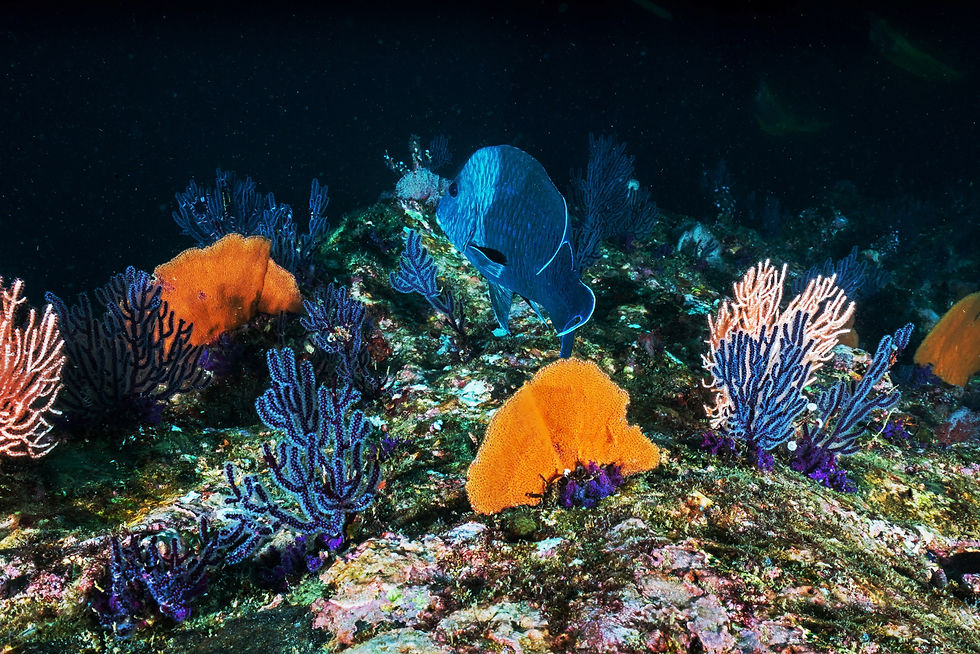Caribbean marine ecosystems: PROCARIBE+ drives sustainable restoration
- Editorial Team SDG14

- Jul 24, 2025
- 4 min read

The Caribbean’s turquoise waters, teeming with vibrant coral reefs and mangroves, are not just natural wonders but economic lifelines for millions. The UNDP GEF UNOPS PROCARIBE+ initiative, launched to protect and restore these marine ecosystems, is a cornerstone in advancing SDG 14 (Life Below Water) and SDG 8 (Decent Work and Economic Growth).
By addressing environmental degradation and fostering sustainable livelihoods, PROCARIBE+ aligns with global sustainability goals, ensuring the Caribbean’s marine wealth supports both nature and people. Restoring these ecosystems is critical: coral reefs alone support 25% of marine life, while coastal communities depend on fisheries and tourism for survival. Failure to act risks irreversible ecological collapse and economic instability, threatening global goals for a resilient, equitable future.
The state of Caribbean marine ecosystems
The Caribbean and North Brazil Shelf Large Marine Ecosystems (CLME+ region), spanning 4.4 million square kilometres, host 10% of the world’s coral reefs and 20% of its mangroves. Yet, these ecosystems face severe threats. The Intergovernmental Panel on Climate Change (IPCC) warns that 99% of coral reefs could vanish if global warming reaches 2°C, undermining SDG 14’s aim to sustainably manage marine ecosystems. Overfishing, pollution, and coastal development exacerbate this decline, with the Caribbean losing 14% of its coral reefs in the past 15 years.
Mangroves, vital for coastal protection, have declined by a third in 30 years. These losses threaten food security, as 100 million Caribbean people rely on reefs for food or livelihoods, and 95 million live within 100 kilometres of vulnerable coastlines. Economically, marine-based tourism and fisheries generate billions annually, but unsustainable practices erode these gains, kindling SDG 8’s focus on sustainable economic growth.
PROCARIBE+: A blueprint for regional action
PROCARIBE+ builds on decades of regional collaboration, including the CLME and CLME+ projects, to protect marine biodiversity and promote a sustainable blue economy. Structured around four thematic components, ocean governance, national capacity building, small grants for conservation, and data management, the initiative unites 26 states and 18 overseas territories. In 2023, PROCARIBE+ partnered with the Mesoamerican Reef Fund to propose Particularly Sensitive Sea Areas (PSSAs) in the Mesoamerican Reef, a 1,000-kilometre ecosystem spanning Belize, Guatemala, Honduras, and Mexico.
This project aims to curb pollution and overfishing, enhancing resilience against climate change. Additionally, PROCARIBE+ supports training for fishers in sustainable practices, directly supporting SDG 8 by creating jobs while preserving ecosystems. Since its inception, PROCARIBE+ has secured funding for nine location-specific outputs, benefiting 19 GEF-eligible countries, with regional knowledge-sharing amplifying impact.
Barbados: A case study in coral restoration
In Barbados, local fishers and scientists are spearheading coral restoration, a community-driven effort often overlooked by global media. At Vauxhall Reef within the Folkestone Marine Reserve, the Coral Reef Restoration Alliance (CORALL) has established a staghorn coral nursery, planting fragments to rebuild degraded reefs. These efforts, supported by PROCARIBE+, align with SDG 14 by enhancing marine biodiversity. Interviews with fishers reveal a deep connection to the ocean, with one stating, “The reef is our lifeblood; without it, our nets are empty.” Scientists report that nursery-grown corals have a 70% survival rate, compared to 50% for natural regeneration, offering hope for scalable restoration. However, funding remains a challenge. While PROCARIBE+ has mobilised $40 million through the Caribbean Biodiversity Fund’s Ecosystem-based Adaptation Facility for 34 projects, fishers note that local initiatives often compete for limited resources. Ensuring equitable funding distribution is critical to sustain these efforts.
Past successes, future challenges
Historically, the Caribbean Challenge Initiative (2008) protected 49,000 km² of marine areas, setting a precedent for regional cooperation. Looking ahead, PROCARIBE+ aims to integrate blue carbon ecosystems, mangroves, seagrasses, and salt marshes, into 2025 Nationally Determined Contributions (NDCs) for countries like Belize and Jamaica.
These ecosystems, covering less than 2% of ocean areas, store half of oceanic carbon, making them vital for climate adaptation and SDG 13 (Climate Action). By 2030, PROCARIBE+ targets enhanced marine protected area networks, aiming to conserve 30% of coastal waters under the 30x30 vision. Yet, challenges persist: ocean acidification, rising sea levels, and insufficient funding threaten progress. The Caribbean Biodiversity Fund’s $7 million from Global Affairs Canada and €4 million from French donors signal growing support, but experts warn that billions more are needed to meet global biodiversity targets.
The Global Society interaction
The Caribbean’s marine crisis transcends borders, demanding global collaboration. The Ocean Coordination Mechanism (OCM), operationalised in 2024 with 18 member countries, exemplifies this by uniting governments, NGOs, and academia by way of organisations like the UNEP’s Cartagena Convention and IOCARIBE. This aligns with SDG 17 (Partnerships for the Goals), fostering knowledge exchange and capacity building. For instance, training in marine spatial planning, supported by UNESCO’s MSP Global Initiative, equips Caribbean nations to balance conservation and economic needs. Globally, the blue economy, valued at $1.5 trillion annually, offers a model for sustainable growth, with the Caribbean leading through innovative financing like blue carbon credits. Collaborative efforts ensure that solutions, from coral nurseries to sustainable fisheries, are shared globally, amplifying impact.
The Caribbean’s marine ecosystems are at a crossroads. PROCARIBE+ demonstrates that unified action can restore biodiversity, bolster livelihoods, and combat climate change, advancing SDG 14 and SDG 8. Barbados’ coral restoration shows the power of local solutions, but scaling these efforts requires sustained global support. As the UN Decade on Ecosystem Restoration continues until 2030, collective commitment to funding, innovation, and partnerships will determine the region’s success. For more on global ocean conservation efforts, visit PROCARIBE+ page or explore the Caribbean Biodiversity Fund.



